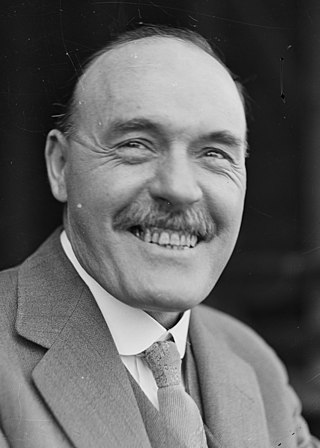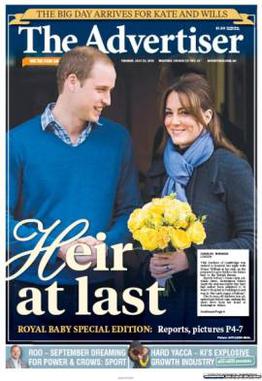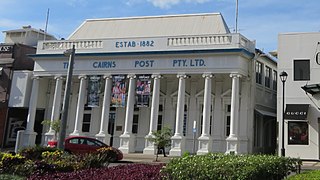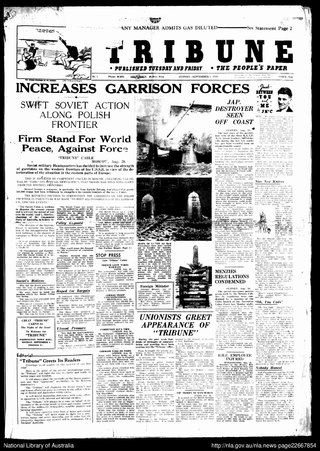
John Thomas Lang, usually referred to as J. T. Lang during his career and familiarly known as "Jack" and nicknamed "The Big Fella", was an Australian politician, mainly for the New South Wales Branch of the Labor Party. He twice served as the 23rd Premier of New South Wales from 1925 to 1927 and again from 1930 to 1932. He was dismissed by the Governor of New South Wales, Sir Philip Game, at the climax of the 1932 constitutional crisis and resoundingly lost the resulting election and subsequent elections as Leader of the Opposition. He later formed Lang Labor that contested federal and state elections and was briefly a member of the Australian House of Representatives.

The Communist Party of Australia (CPA), known as the Australian Communist Party (ACP) from 1944 to 1951, was an Australian political party founded in 1920. The party existed until roughly 1991, with its membership and influence having been in a steady decline since its peak in 1945. Like most communist parties in the west, the party was heavily involved in the labour movement and the trade unions. Its membership, popularity and influence grew significantly during most of the interwar period before reaching its climax in 1945, where the party achieved a membership of slightly above 22,000 members. Although the party did not achieve a federal MP, Fred Paterson was elected to the Parliament of Queensland at the 1944 state election. He won re-election in 1947 before the seat was abolished. The party also held office in over a dozen local government areas across New South Wales and Queensland.

The Advertiser is a daily tabloid format newspaper based in the city of Adelaide, South Australia. First published as a broadsheet named The South Australian Advertiser on 12 July 1858, it is currently a tabloid printed from Monday to Saturday. The Advertiser came under the ownership of Keith Murdoch in the 1950s, and the full ownership of Rupert Murdoch in 1987. It is a publication of Advertiser Newspapers Pty Ltd (ADV), a subsidiary of News Corp Australia, itself a subsidiary of News Corp. Through much of the 20th century, The Advertiser was Adelaide's morning broadsheet, The News the afternoon tabloid, with The Sunday Mail covering weekend sport, and Messenger Newspapers community news. The head office was relocated from a former premises in King William Street, to a new News Corp office complex, known as Keith Murdoch House at 31 Waymouth Street.

The Argus was an Australian daily morning newspaper in Melbourne from 2 June 1846 to 19 January 1957, and was considered to be the general Australian newspaper of record for this period. Widely known as a conservative newspaper for most of its history, it adopted a left-leaning approach from 1949. The Argus's main competitor was David Syme's more liberal-minded newspaper, The Age.

Sir Simon Fraser was a Canadian-Australian businessman, pastoralist, and politician. He was a Senator for Victoria from 1901 to 1913, having previously been a member of the colonial Parliament of Victoria.

The Cairns Post is a major News Corporation newspaper in Far North Queensland, Australia, that exclusively serves the Cairns area. It has daily coverage on local, state, national and world news, plus a wide range of sections and liftouts covering health, beauty, cars and lifestyle. The Cairns Post is published every weekday and a weekend edition which is called The Weekend Post is published on Saturdays.

A coffee palace was an often large and elaborate residential hotel that did not serve alcohol, most of which were built in Australia in the late 19th century.

The Melbourne Advertiser was the first newspaper published in Melbourne, in what was then known as Port Phillip District, and now is Victoria, Australia. It was published by John Pascoe Fawkner, a co-founder of Melbourne. The first edition appeared on 1 January 1838 handwritten in ink by Fawkner himself and displayed at his hotel.

John Norton was an English-born Australian journalist, editor and member of the New South Wales Parliament. He was a writer and newspaper proprietor best known for his Sydney newspaper Truth. Norton was arguably one of Australia's most controversial public figures ever.

George Selth Coppin was a comic actor, a theatrical entrepreneur, a politician and a philanthropist, active in Australia.

Sir George Stephenson Beeby KBE was an Australian politician, judge and author. He was one of the founders of the Labor Party in New South Wales, and represented the party in state parliament from 1907 to 1912. He fell out with the party and later served as an independent, a Nationalist, and a Progressive. He left parliament in 1920 to join the state arbitration court, and in 1926 was appointed to the Commonwealth Court of Conciliation and Arbitration. He was Chief Judge from 1939 until his retirement in 1941.

John Keith McDougall, also known as J. K. McDougall, was an Australian politician, poet and Labor activist.

Donald Alaster Macdonald was an Australian journalist and nature writer, writing under the pen names including 'Observer' and 'Gnuyang' (gossip). He was considered one of Australia's widely known journalists, and is in the Melbourne Press Club's Australian Media Hall of Fame. He was credited with making 'Australian natural history and botany popular interests'.

Edmund Duggan was an Irish-born actor and playwright who worked in Australia. He is best known for writing a number of plays with Bert Bailey including The Squatter's Daughter (1907) and On Our Selection (1912). His solo career was less successful than Bailey's. His sister Eugenie was known as "The Queen of Melodrama" and married noted theatre producer William Anderson, for whom Duggan frequently worked as an actor, writer and stage manager.

The Sun was an Australian afternoon tabloid newspaper, first published under that name in 1910.

The International Socialist was a newspaper published in Sydney, Australia from 1910 to 1920. It has also been published as International Socialist Review for Australasia.

Tribune was the official newspaper of the Communist Party of Australia. It was published by the Central Committee of the Communist Party of Australia from 1939 to 1991. Initially it was subtitled as Tribune: The People's Paper. It was also published as the Qld Guardian, Guardian (Melbourne), Forward (Sydney). It had previously been published as The Australian Communist, (1920-1921) The Communist, (1921-1923) and the Workers' Weekly (1923-1939).

Duncan & Fraser Limited was a vehicle manufacturing company founded in 1865 in Adelaide, South Australia that built horse-drawn carriages and horse trams, and subsequently bodies for trains, electric trams and motor cars, becoming one of the largest carriage building companies in Australia.
The Socialist Labor Party was a socialist political party of Australia that existed from 1901 to the 1970s. Originally formed as the Australian Socialist League in 1887, it had members such as George Black, New South Wales Premier William Holman and Prime Minister Billy Hughes.
The Record was a weekly newspaper published in Melbourne, Victoria, from 1869 to at least 1954, serving Port Melbourne, Albert Park, Middle Park, and Garden City.

















